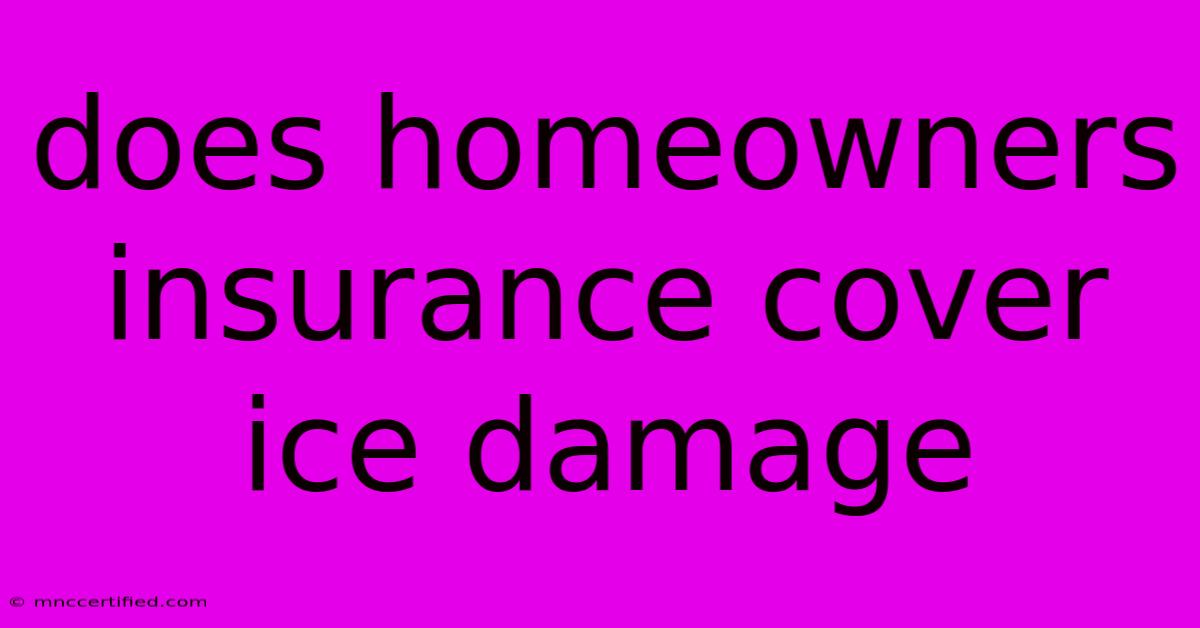Does Homeowners Insurance Cover Ice Damage

Table of Contents
Does Homeowners Insurance Cover Ice Damage? A Comprehensive Guide
Winter can be a beautiful time of year, but it can also bring its fair share of challenges, especially when it comes to your home. One of the most common problems homeowners face during the colder months is ice damage. But does your homeowners insurance cover the cost of repairs? The answer, unfortunately, isn't always a simple yes.
Understanding Ice Damage and Your Policy
Ice damage can manifest in various forms, including:
- Frozen pipes: This is a major issue, as burst pipes can lead to significant water damage and mold growth.
- Ice dams: These form on roofs when melting snow refreezes, causing leaks and water damage to your home's interior.
- Foundation damage: Freezing and thawing cycles can weaken foundations, leading to cracks and other structural problems.
- Damage from falling ice: Icicles and chunks of ice falling from roofs can cause damage to windows, siding, and other exterior features.
Your homeowners insurance policy may or may not cover these types of damage, depending on a few key factors:
- Your specific policy: Carefully review your policy documents to understand what perils are covered and what exclusions apply.
- The cause of the damage: Some policies might not cover damage resulting from negligence, such as failing to maintain your heating system or allowing pipes to freeze.
- The extent of the damage: Insurance companies typically have deductibles, and some policies may have limits on the amount of coverage for specific types of damage.
What Does Your Policy Usually Cover?
Many homeowners insurance policies offer coverage for:
- Frozen pipes: This coverage usually includes the cost of repairs to the pipes themselves, as well as any resulting water damage.
- Ice dams: Policies often cover repairs to the roof and any water damage caused by leaks.
- Foundation damage: Coverage for foundation damage may be limited, depending on the cause and the extent of the damage.
- Damage from falling ice: Coverage for this type of damage may be included as part of your policy's "windstorm" or "hail" coverage.
However, policies may exclude coverage for:
- Damage caused by negligence: If you failed to take reasonable steps to prevent the damage (like leaving your heating system off while you were away), your insurance company may not cover the costs.
- Damage to certain structures: Policies may exclude coverage for damage to detached structures like sheds or garages.
- Damage exceeding the policy limits: Your policy may have limits on the amount of coverage for specific types of damage, such as water damage or damage to your foundation.
Taking Preventive Measures
The best way to protect your home from ice damage and ensure you have adequate coverage is to:
- Know your policy: Thoroughly read and understand your homeowners insurance policy. If you have questions, contact your insurance agent for clarification.
- Take preventive measures: Insulate your pipes, maintain your heating system, and remove snow and ice from your roof regularly. This can help minimize the risk of damage and reduce your insurance costs.
- Consider supplemental coverage: You may want to consider purchasing additional coverage for specific perils, like frozen pipes or ice dams, if your current policy has limited coverage.
What to Do If Ice Damage Occurs
If your home suffers from ice damage, follow these steps:
- Contact your insurance company: Report the damage to your insurance company immediately.
- Document the damage: Take photos and videos of the damage, and keep records of any expenses incurred for repairs or temporary housing.
- Secure your property: Take steps to prevent further damage, such as covering holes in your roof or boarding up broken windows.
- Hire a qualified contractor: Get estimates from reputable contractors for repairs. Your insurance company may have a list of preferred contractors.
Remember: Your insurance company will work with you to assess the damage and determine the extent of coverage. Be prepared to provide documentation and cooperate with their investigation.
Conclusion
Understanding your homeowners insurance policy and taking proactive steps to prevent ice damage are essential for protecting your home and your finances. By being informed and prepared, you can minimize the risk of costly repairs and ensure that you have the financial protection you need in the event of a winter-related disaster.

Thank you for visiting our website wich cover about Does Homeowners Insurance Cover Ice Damage. We hope the information provided has been useful to you. Feel free to contact us if you have any questions or need further assistance. See you next time and dont miss to bookmark.
Featured Posts
-
Control Of Us Senate Swings To Gop
Nov 07, 2024
-
Christensen January Transfer Barcelonas Fee
Nov 07, 2024
-
Benfica Vs Bayern Munich Live Match
Nov 07, 2024
-
Trevor Sorbies Cancer Battle Weeks Remaining
Nov 07, 2024
-
Is Rock Steady Boxing Covered By Insurance
Nov 07, 2024